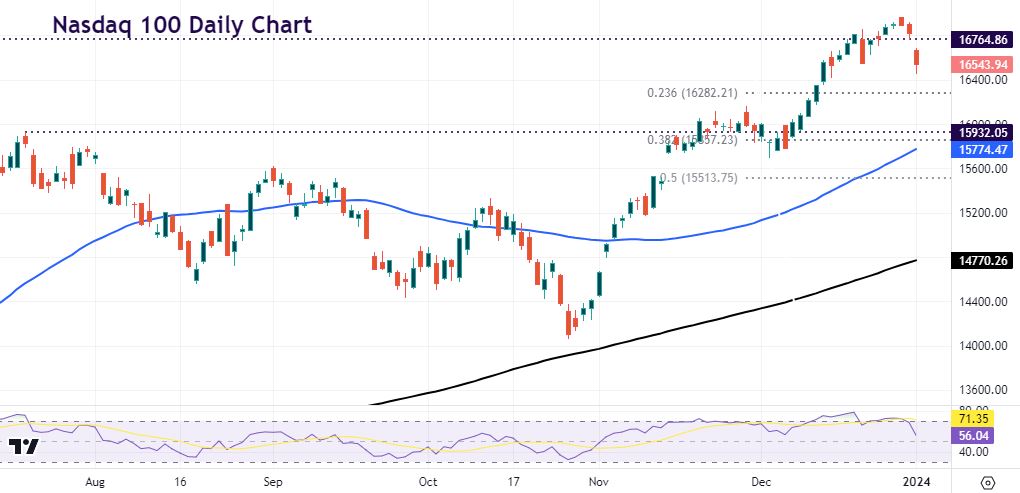USD rips and stocks dip as tech takes a hit

Headlines
* USD set for biggest daily jump since October as US yields rebound
* Tech bulls loosen their grip, Apple downgrade hurts
* US jobs numbers to show healthy hiring, easing pay growth
* Gold, oil prices rise on heightened geopolitical tensions in Middle East
FX: USD rose sharply on the first trading day of the year on higher US yields. The DXY posted its biggest daily percentage gain since October, hitting a peak of 102.22. The 10-year US Treasury yield eyed its largest daily increase in more than three weeks. Geopolitical tensions continue to mount in both the Red Sea and Israel.
EUR tumbled to levels last seen before the holiday period. Markets digested data showing eurozone PMIs contracted in December for an 18th month in a row. There was little other news flow. Eurozone inflation data is released on Friday.
GBP fell to a nine-session low, near to 1.26. Cable made a five-month high last Thursday at 1.2828. Final PMI data showed deeper contraction continued for the 17th consecutive month in December.
USD/JPY moved above 142 before paring gains. The major had slid to a low of 140.24 last week, a level last seen in late July. There is resistance around 142.47 with the 200-day SMA at 143.05.
AUD touched support at a Fib level at 0.6764. Last week, the aussie hit0.6871, a 23-week high, just below the summer peaks around 0.69. USD/CAD bounced for a fourth straight day off support around 1.32.
Stocks: US equities fell sharply as big tech took a beating on the first full trading day of 2024. The S&P 500 lost 0.57% to settle at 4,742. The equal-weighted index outperformed the market cap-weighted benchmark. The tech-heavy Nasdaq 100 finished 1.68% lower at 16,543. The Dow rose 0.07% to close at 37,715.The Magnificent Seven major tech stocks all declined after hugely outperforming the major market indices last year. Apple was downgraded by an investment bank, Barclays, to a “sell” rating – only the second brokerage to do so. Analysts cited demand concerns for its products including weak iPhone 15. Middel East tensions and downbeat PMIs added to the mood.
Asian futures trade in the red. Chinese equities slipped close to 2% in Hong Kong after a less optimistic speech from President Xi. Fresh data also pointed to factory activity falling in December and remaining below the 50 contraction level.
Day ahead – US ISM Manufacturing and FOMC Minutes
There are several important economic releases this week, mostly out of the US. US ISM manufacturing and services sector data will inform as leading indicators for a slowing economy. The former released tomorrow is expected to tick up slightly but would still be in contraction territory for a 16th straight month. The manufacturing sector remains under considerable pressure.
The Fed minutes are from the pivot meeting last month where there was a change in the dot plots. Policymakers removed the extra hike for 2023 and guided an extra 25bp cut for this year so a total of 75bp versus 50bps previously. Markets believe there is a broader consensus on the FOMC in favour of easing. Key will be how diverse are the range of views which are reflected in the diverse dot range and how broad is support against premature easing.
Chart of the Day – Nasdaq 100 tumbles from the highs
The Nasdaq 100, packed with growth and tech companies, was the standout stock market index of last year. It posted its first half-century performance since 2009, but this comes after losses of more than 32% in 2022. The Magnificent Seven tech stocks were a big reason for the gains.
The preference for Apple, Microsoft, Google parent Alphabet, Amazon, Facebook parent Meta, Tesla and Nvidia, was down to the growth-focused search for stocks with links to artificial intelligence. Tech investing is about growth stocks and exciting themes such as AI act as catalysts. Expectations for lower interest rates also boosted the sector which means any disappointment in the soft landing theme could see more selling. History says threading the needle is a tricky job. That said, the magnificent seven could also be seen as something of a safety play. They are megacap companies that aern’t reliant on struggling banks or volatile capital markets.

